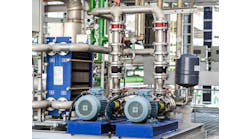Last month, National Public Radio aired on its weekend edition a 5-minute segment about one of the vanishing breed of typewriter repairmen. Paul Schweitzer has run Gramercy Typewriter Co. in the Chelsea section of Manhattan since 1959, taking over a business that his father started in 1932 in the midst of the Depression, fixing manual and electric typewriters. While today Gramercy also services computer printers, typewriter repair still accounts for about a quarter of its business, Schweitzer tells me. He notes that ten years ago the Manhattan Yellow Pages had five to six pages of listings of typewriter repair shops. Today, the heading takes up about a column and a half and only includes 35 companies. Still, New York City undoubtedly is far better served than other areas of the country. (You can listen to the segment via http://www.npr.org/templates/story/story.php?storyId=5330310.)
Schweitzers shop in the Flatiron Building on 23rd Street takes up only about 280 ft2 and is crammed with typewriter parts and supplies like ribbons. The tight space isnt much of a problem as most of the business involves service calls.
Gramercy has two other typewriter mechanics; both are in their 40s, and Schweitzer doesnt know of any younger ones. Thats not likely to change. Theres certainly little reason for someone starting a career to consider going into typewriter repair anymore.
The diminishing ranks of skilled technicians isnt the only problem. A repair may require replacement of parts and the parts simply may not be available. New old stock bits and pieces are not abundant and available only for select makes and models, particularly newer and more-common machines; so, repairs often depend upon the availability of parts salvaged from other typewriters.
Yet, quite a few people still use typewriters. Indeed, some actually prefer typewriters to computers. The clacking sound the machines make and the satisfaction of seeing a letter on paper immediately as you type it have a certain appeal. Some writers say the difficulty or at least the messiness of making corrections on a typewriter forces them to think a bit more before hitting the keys and thus leads to better work. Whatever the motivation, people still are typing away on old U.S.-made IBMs, Underwoods, Smith-Coronas, Royals and Remingtons, as well as imports such Olivettis, Hermes and Olympias. (U.S.-made machines at one point dominated the world market, but much of the production ultimately went overseas sound familiar?)
The situation is hardly unique to typewriters. Last month, I had to put in a fine Swiss watch for service. Finding a really good watchmaker not just someone who can replace a battery or install a strap is becoming tougher. Skilled watchmakers also seem to be a dying breed. And getting parts can be a problem and even when they are available, pardon the pun, time-consuming.
What does all this rambling have to do with chemical plants? Some facilities rely on highly specialized equipment hasnt been made for ages. Others are well satisfied with the performance of what might be called outmoded hardware. So, the same issues of lack of skilled technicians and adequate stocks of parts are a concern. Worse yet is the frustration of actually having to scrap equipment that otherwise could continue to play a productive role. Perhaps theres nothing that really can be done technically or economically. Some might call that progress. Im not so sure.
